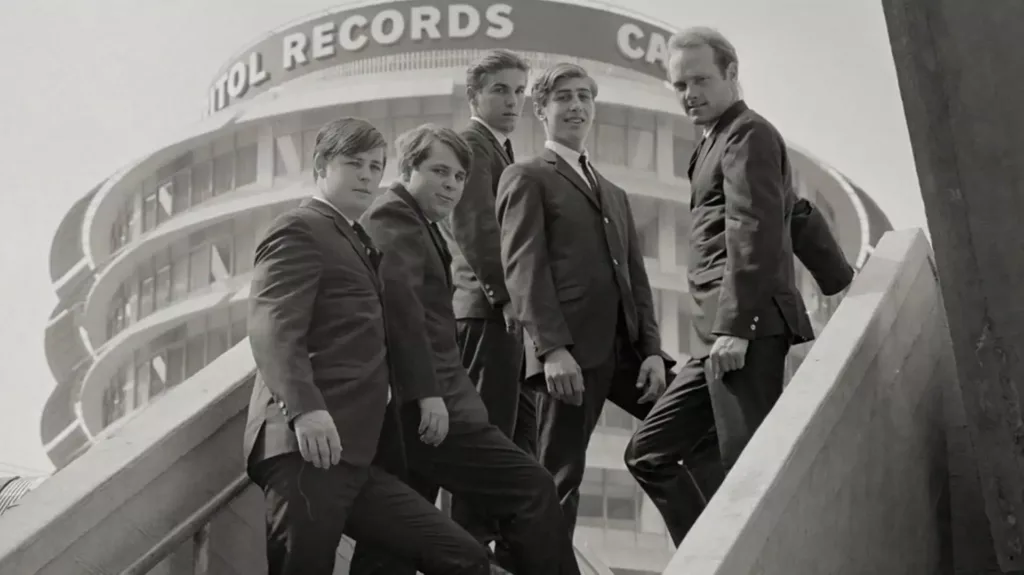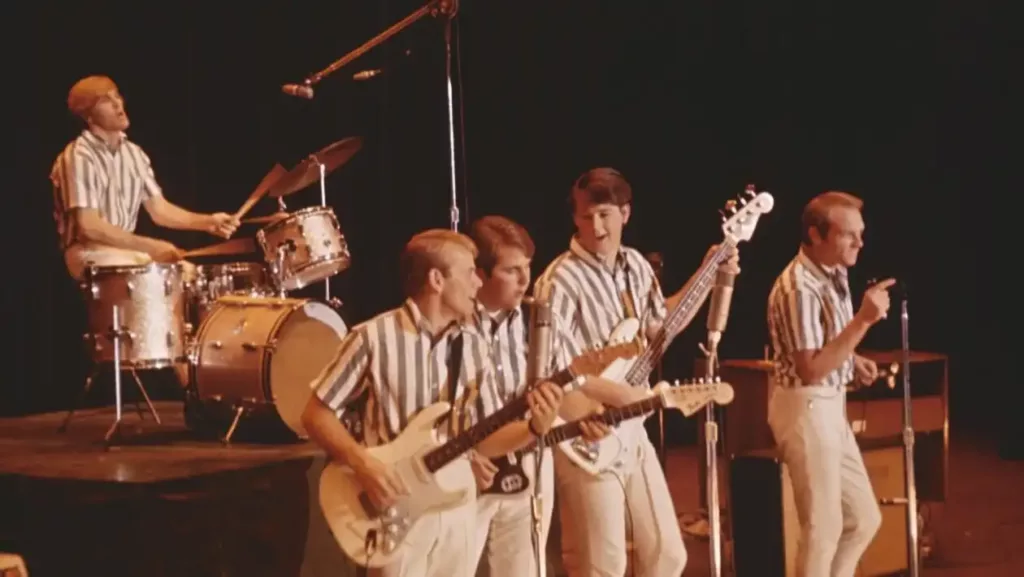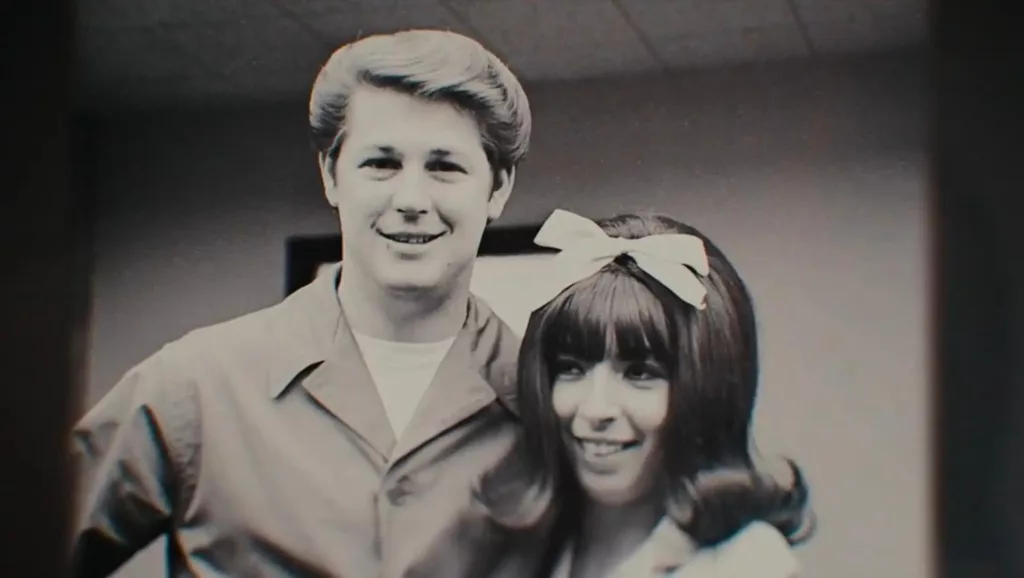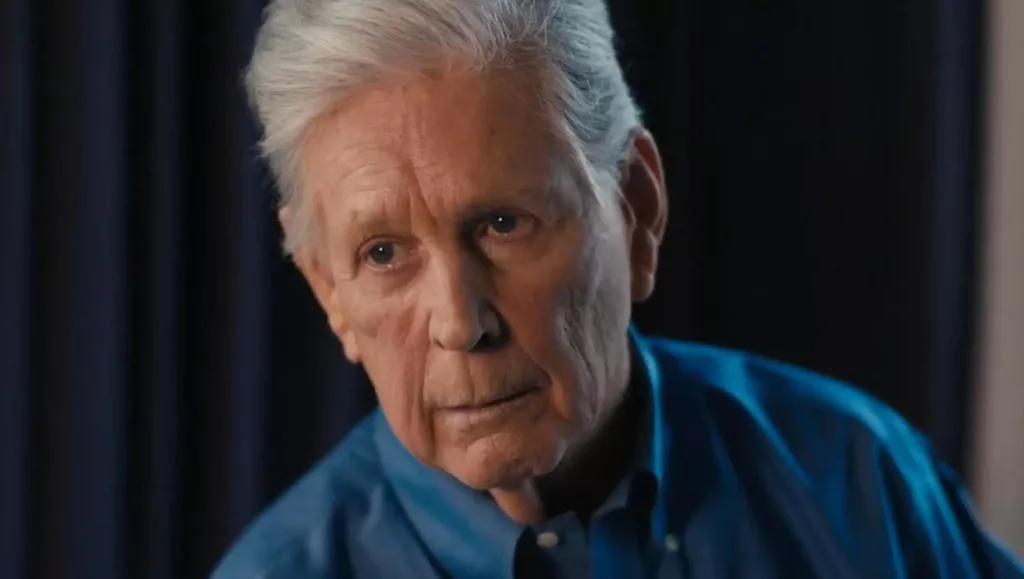The Beach Boys emerged from Southern California with an infectious sound that perfectly captured carefree summers by the shore. Starting in the early 1960s, Brian Wilson, Mike Love, Al Jardine, Carl Wilson, and Dennis Wilson created vocal harmonies and surf rock anthems that evoked imagery of the sun, sand, and freedom. Their music became inextricably linked to hot days, cool ocean waves, and memories of youth. Over a career spanning three decades, the band brewed hits like “Surfin’ USA,” “Good Vibrations,” and “Kokomo,” cementing their status as ambassadors of California culture and pioneers of the pop genre.
Now, a new documentary directs its lens on the legendary group’s history. Directed by Frank Marshall and Thom Zimny, “The Beach Boys” charts the band’s rise from a garage venture to worldwide superstardom. It explores the creative genius of Brian Wilson, volatile family dynamics, and internal struggles that both inspired artistic highs and led to their demise. Spanning over two hours, the film offers an enjoyable look at the band’s legacy. Although it provides a mostly celebratory overview, some viewers may wish it delved deeper into the darker periods that shaped the men behind the music.
Either way, the documentary is a fitting tribute to one of America’s most treasured bands. It transports audiences back to simpler times through the Beach Boys’ colorful career. Even those who are only passingly familiar with their oeuvre may find something new to appreciate in their story. Most importantly, it reminds us of the power of familiar melodies to evoke deep feelings of nostalgia for eras past.
The Beach Boys’ Rising Tide of Harmony
Growing up in Southern California alongside the burgeoning surf culture of the 1960s, cousins Brian Wilson and Mike Love discovered a natural affinity for vocal harmony. Joining forces with Brian’s brothers Carl and Dennis Wilson, the trio experimented with blending their voices in the family Volkswagen. As their tight harmonies took shape, they recruited Al Jardine to complete the sound.
With an initial investment from Al’s mother, the band acquired instruments and got to work crafting their brand of musical sunshine. Drawing from the surf rock styles they heard around California as well as vocal groups like The Four Freshmen, their debut single “Surfin'” earned regional airplay in 1961. More surfing anthems followed, keeping tempo with the sport’s popularity.
As the band’s songwriter and arranger, Brian steadily progressed their sound beyond simple surf playlists. His creative instincts and perfectionism drove the group to new melodic heights. In 1963’s “Surfer Girl,” Brian’s diverse influences, from Phil Spector to Chuck Berry, enriched their compositions. Hit singles like “Surfin’ Safari” and “Surfin’ U.S.A.” soon brought nationwide fame, with the latter climbing to number 3 on the charts.
While ambitious in the studio, Brian chafed against relentless touring. The demands of the road conflicted with his desire for creative control. After a breakdown in 1964, Al assumed many of Brian’s duties on tour so he could focus on songcraft. This allowed Brian’s extraordinary talents to fully blossom. Backed by stellar LA session players, he devised intricate Wall of Sound productions that transcended any single genre.
Through it all, the Beach Boys’ buoyant melodies and primrose harmonies epitomized joyful escape. Their music became the ideal accompaniment to surfboards, convertibles, and summer romance. More than just a surf band, they had become the compelling voice of the American Dream—yet greater strides were still to come.
Magnificent Milestones: Pet Sounds and Smiles
By the mid-1960s, Brian Wilson had established himself as one of pop music’s premier craftsmen. Where other bands contented themselves with three-minute ditties, Brian sought to push boundaries. His skill at layered instrumentation and rich vocal arrangements elevated The Beach Boys to America’s top band. But even they couldn’t foresee how far Brian would take them next.
With 1965’s Today! and Summer Days (and Summer Nights! ), Brian flexed his production muscle. Then on Pet Sounds, he aimed higher, crafting what he called “a good translation of the Beatles’ album Rubber Soul.” The psychedelic folk-rock of “Sloop John B” and the intimate ballad “God Only Knows” stunned with their depth and sophistication. Where lyrics once centered on surfing, Brian pondered love, life, and spirituality. His bandmates struggled to grasp the album’s merits, but critics and peers gave it rapturous praise.
Hearing Pet Sounds shook members of The Beatles to the core. Paul McCartney described its intricacy as “pretty damn close to genius,” and the Fab Four poured their astonishment into Sgt. Pepper’s Lonely Hearts Club Band. Brian too drew inspiration, envisioning Smile as a multimedia masterwork. Sadly, deteriorating mental health hindered its completion. But songs like “Good Vibrations” and snippets like the critically acclaimed “Surf’s Up” proved his creative well seemed bottomless.
Of course, not all embraced Pet Sounds upon release. Both the public and record labels found its complexity too divergent. Low sales wounded the sensitive Brian, who’d invested himself fully. Its real renown arrived later, as generations uncovered its magnificence. Now regarded alongside Sgt. Pepper as quintessential 1960s artistic statements, it displays the daring vision that made Brian a luminary. While private turmoil prevented his magnum opus Smile, its enduring mystique leaves us eager to marvel at what additional revelation it may have wrought.
In these albums, Brian distilled on tape the melodic architecture playing in his head. That ability to transform fleeting thoughts into sonic splendor raised the Beach Boys above the surfing formula. It also leaves us grateful that even in hardship, creative spirits can shine and continue rewarding those open to their gifts long after the curtains fall.
Turbulent Tides: Internal Strife and Artistic Decline
As The Beach Boys’ fame grew, darker undercurrents also swelled. Brian Wilson had always been the Beach Boys’ musical visionary, but shouldering their endless schedule took a toll. His spiraling mental health and drug use dragged the band down a troubled path.
Away from home, Brian struggled with severe anxiety. Overwhelmed in the studio too, breakdowns cut short many sessions. Even at the top, though, family troubles lingered. The boys’ father, Murry, had been an abusive presence, inflicting deep scars that never fully healed. As manager, he bungled opportunities, selling their publishing rights against their wishes.
Internal rifts worsened when Brian withdrew to focus on masterworks like Pet Sounds. Although revered today, its complexity bewilders audiences, straining Brian’s spirit. Cousin Mike Love’s lawsuit over songwriting credits then triggered further acrimony, threatening the bond holding The Beach Boys aloft.
In darker times, they faced external anguish too. When brother Dennis became associated with Charles Manson, that cult’s monstrous acts haunted him until the end. All the while, drugs clouded minds and sapped creativity. Attempts to reinvent their sound with Wild Honey and Friends mostly missed the mark.
By the 1970s, the Beach Boys were adrift. Despite gems like Surf’s Up, most albums underwhelmed. When the brothers’ voices fell silent too soon, the light diminished for good. Yet even in the shadows, their legacy endured. In each new generation who discovers summertime transcendence within their songs, The Beach Boys’ timeless spirit burns brightly once more. Though turbulence tore at them from within and without, their art has ripples that extend far beyond the surf.
Lifelong Summer: The Beach Boys’ Legacy Through the Decades
Just when it seemed The Beach Boys’ light had faded, a strange twist of fate lifted their fortunes. In 1974, Capital Records released Endless Summer, a compilation cherry-picking their early hits. Against all odds, it flew up the charts, cementing the band as timeless.
Renewed success wasn’t all smooth sailing, though. Internal ripples remained from past storms. Brian still grappled with demons, while Dennis followed a darker path. Their stellar voices fell silent far too soon—Carl in 1998, Dennis in 1983. Always the unpredictable wave, life continued rolling for the rest.
They carved fresh paths too. Experimenting with disco and welcoming new members, The Beach Boys adapted to changing tides. Gems still surfaced amid the flux, though nothing matched their initial magic. Years of testing each other’s limits had eroded bonds, yet one truth endured: together, their harmony endured.
A 2012 reunion proved both a blessing and a curse. Fans reveled in hearing anthems live once more, but tensions reemerged. Familiar currents beneath the surface resurfaced, eroding goodwill. Some hurts ran too deep to heal.
Yet beyond what divides them, one thing unites them: a legacy transcending time. Their songs are summer’s eternal friends, sparking nostalgia across generations. And their influence lives on, inspiring every band to fuse Beach Boys vibes with modern twists.
Now, a golden autumn has arrived. But the light and love The Beach Boys spread will echo wherever we glimpse surf, sand, and sunsets by the sea. Their lifelong summer in our hearts is a gift forever treasured and forever renewed.
Assessing the Sundown Story
On the surface, this documentary offers some prime viewing for any Beach Boys buff. Archival footage puts you right beside the group in their prime, soaking in their layered harmonies. You can’t help but tap your toes, hearing classics like “Surfin USA” in full stereo shine. Interviews also grant insight, with the band sharing memories both joyful and grim.
Yet for those seeking deeper dives into the magic of creation, reactions may be mixed. While paying homage to Brian’s genius, the film barely lingers on artistic works like Pet Sounds. You learn sparks like The Beatles being inspired, but not the sweat and tears involved. Fans had hoped for more analytic shine than just surface-level praise of results.
Similarly, darker periods get short. Scandals and health crises that tore the crew apart are raised, then rushed past. More context could have explained struggles without dwelling on the dire. A balance addressing both bright and bleak might have left a fuller understanding.
The finale too rapidly flips and flops through its decline. Just when momentum builds for the for the learning of comebacks, the tale tails off abruptly. Just envisions what richness additional focus on later years may have yielded.
In the end, it serves its purpose as an introduction for newcomers. But those steeped in beach lore already may find the shallow dive leaves them still desiring splashier depth on nuances that make this band truly epic. For novel viewers, though, it spreads enough sunshine to spark curiosity for dipping their toes in the timeless tunes further. An enjoyable watch yet just skimming the surf—there’s still more waves of wisdom to be found below the sandy surface.
Reflections on a Summer Sunset
All in all, The Beach Boys Doc hits the high notes while glossing over some others. It succeeds in handing newcomers an earworm, making their influence hard to deny. But for the devoted, some strands wanted deeper plumbing.
Their tale and talents clearly shaped pop culture’s fabric. Reducing such a rich history to snippets risks shortchanging what makes their music endure—the sweet harmonies intertwined with life’s darker threads.
Still, no single film could unravel years this prolific. And dwelling in dimness risks ignoring their light. As Don said, they distilled a dream that still inspires. Their melodies remind us that even when clouds gather, surf and the sun still call above the murk.
In sparks of sincerity, we see the enduring bond beneath the discord. How their collective craft outpaced any one perspective. Their story may lack a neatly-tied conclusion, but the genre they defined proves timeless.
So if this film dips its toes where some wish to plunge, its breezy pace perfectly suits Memorial Day backyard playback. It sparked new curiosity about their magnificence, ensuring their summertime soundtrack stays in rotation for seasons to come.
The Review
The Beach Boys
While The Beach Boys documentary hits many high notes in capturing the band's iconic sounds and early success, it fails to examine some of the darker periods and complex personal dynamics that define their rich legacy. Though enjoyable overall, a deeper dive into their creative processes and internal conflicts would have benefited devoted fans.
PROS
- Provides a good overview of the band's history and rise to fame
- Features archival footage and interviews that offer insights
- Captures the magic of their vocal harmonies and musicianship
- Succeeds in celebrating their music and cultural impact
CONS
- Glosses over darker periods and internal conflicts
- Fails to deeply examine their creative processes
- Rushes through later years and band breakup
- Leaves a desire for more analysis from long-time fans






















































Discussion about this post